Proper labrador nutrition is crucial for maintaining the health and vitality of your beloved Labrador Retriever. As one of America’s most popular dog breeds, Labs require specific dietary considerations to support their active lifestyle and prevent common health issues. In this comprehensive guide, we’ll explore everything you need to know about feeding your Labrador right.
Understanding Your Lab’s Nutritional Needs
Labradors are known for their hearty appetites and tendency to obesity, making proper nutrition even more critical. As discussed in various dog care articles at Pet like boss, these energetic companions need a well-balanced diet that matches their activity level and life stage.
Macronutrients for Your Lab
Protein Requirements
- Adult Labs: 25-30% protein content
- Puppies: 28-32% protein content
- Senior Labs: 23-25% protein content
Quality protein sources should include – Chicken- Fish- Turkey- Lamb- Beef
Healthy Fats
Your Lab needs good fats for:- Coat health- Joint support- Energy production- Brain function
Aim for 12-15% fat content from sources like – Fish oil- Flaxseed- Chicken fat- Coconut oil
Creating the Perfect Feeding Schedule
For more detailed information about dog care and feeding schedules, check out our comprehensive dog guide.
Puppy Feeding (2-12 months)
- 3-4 meals per day
- Measured portions based on weight
- High-quality puppy formula
Adult Feeding (1-7 years)
- 2 meals per day
- Consistent feeding times
- Portion control is crucial
Senior Feeding (7+ years)
- 2-3 smaller meals
- Lower calorie options
- Joint support supplements
Common Nutritional Mistakes to Avoid
- Overfeeding
- Poor quality ingredients
- Inconsistent feeding times
- Too many treats
- Insufficient water
Special Considerations in Labrador Nutrition
Weight Management
Labs are prone to weight gain, so monitoring their food intake is essential A proper labrador nutrition plan should include – Regular weigh-ins- Measured portions- Limited treats- Regular exercise
Food Allergies
Some Labs may experience food sensitivities. Common allergens include:- Wheat- Soy- Corn- Certain proteins
Raw Diet Options
Some owners opt for raw feeding. If considering this approach:- Consult your vet first- Ensure proper balance- Practice safe food handling- Transition gradually
Supplements for Optimal Health
Consider these supplements for your Lab:1. Glucosamine for joints2. Omega-3 fatty acids3. Probiotics4. Multivitamins (if recommended)
Choosing the Right Food Type
Dry Kibble
Pros:- Convenient- Cost-effective- Long shelf life- Dental benefits
Cons:- Variable quality- Less moisture content- Some artificial preservatives
Wet Food
Pros:- High moisture content- Appealing taste- Easy to digest
Cons:- More expensive- Shorter shelf life- Can promote dental issues
Fresh/Raw Food
Pros:- Natural ingredients- No preservatives- High nutritional value
Cons:- Requires preparation- More expensive- Storage challenges
Life Stage-Specific Nutrition
Puppy Stage
Focus on:- Growth support- Brain development- Bone health- Immune system support
Adult Stage
Maintain:- Healthy weight- Energy levels- Muscle mass- Joint health
Senior Stage
Support:- Joint mobility- Weight management- Organ function- Immune system
Signs of Good Nutrition
Your Lab is getting proper labrador nutrition if you observe:1. Shiny coat2. Good energy levels3. Healthy weight4. Regular digestion5. Clear eyes6. Strong teeth and gums
Troubleshooting Common Issues
Loss of Appetite
Possible causes:- Illness- Stress- Food quality- Environmental changes
Excessive Weight Gain
Solutions:- Adjust portions- Increase exercise- Choose lower-calorie foods- Limit treats
Digestive Issues
Management:- Gradual food transitions- Probiotics- Limited ingredients- Regular feeding schedule
Tips for Success
- Measure portions accurately
- Stick to feeding schedules
- Monitor weight regularly
- Choose age-appropriate food
- Provide fresh water always
- Limit table scraps
The Bottom Line
Proper labrador nutrition isn’t just about filling a bowl with food; it’s about providing the right nutrients in the right amounts at the right times. By following these guidelines and paying attention to your Lab’s individual needs, you can help ensure a long, healthy, and happy life for your furry friend.
Remember that every Lab is unique, and what works for one might not work for another. Always consult with your veterinarian before making significant changes to your dog’s diet, especially if they have specific health concerns or conditions.
Keep in mind that good nutrition is just one part of overall health – regular exercise, veterinary check-ups, and lots of love are equally important for your Lab’s well-being. With proper care and attention to their nutritional needs, your Labrador can thrive and be your loyal companion for many years to come.












